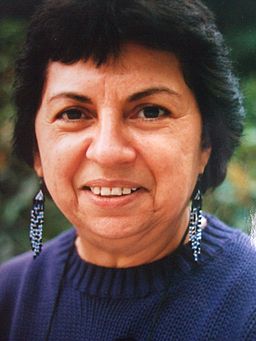
K. Kendall, CC BY 2.0 https://creativecommons.org/licenses/by/2.0, via Wikimedia Commons
Gloria Anzaldúa was an influential queer Chicanx theorist, writer, poet, and scholar. While she was driven out of academia early in her career due to the ways that she defied conventional academic boundaries of genre and discipline, she eventually came back to academia, and was in the process of completing a dissertation at the University of California at Santa Cruz when she died.
Her most notable books include the important women of color feminist anthology, This Bridge Called My Back, edited with Cherrie Moraga. She also wrote Borderlands/La Frontera. After her death, in 2015, her last writings were published in the book Light in the Dark/Luz en lo Oscuro, edited by Ana Louise Keating, whom she referred to as her comadre.
Some of the key concepts she wrote about include nepantla and the Coyolxauhqui imperative. For Anzaldúa, border living was akin to a superpower, in which the gift of a nepantla perspective of more than one language, culture, identity and history enables greater insight and understanding than binary approaches. Nepantla is a Nahuatl word meaning “in-between space” and for Anzaldúa it is “the point of contact between worlds–between imagination and physical existence, between ordinary and nonordinary (spirit) realities” (Anzaldúa 2015, 2). The Coyolxauhqui imperative is
a struggle to reconstruct oneself and heal the sustos resulting from woundings, traumas, racism and other acts of violation que hechan pedazos nuestras almas, split us, scatter our energies, and haunt us…[it is] calling back those pieces of the self/soul that have been dispersed or lost, the act of mourning the losses that haunt us
(Anzaldúa 2015, 1)
These concepts have been tremendously influential in subsequent thinking about hybridity, multiculturalism, and rejections of binarism. Even though Anzaldúa has sometimes been critiqued in recent years for not better anticipating transgender themes or for insufficiently centering indigenous knowledge and critiquing coloniality in her conceptualizations of mestizaje, yet she is widely regarded for being ahead of her time in much of her theorization. While she struggled for economic and symbolic recognition of her work during her lifetime, in recent years her influence has been more widely chronicled and acknowledged.
Anzaldúa suffered from numerous health issues over the years, including diabetes, depression, an endocrinological disorder, and more. Eventually it was complications due to diabetes that took her life. She wrote extensively about the ways that physical suffering informed her academic work and theorization, most notably in Light in the Dark:
For you, writing is an archetypal journey home to the self, un proceso de crear puentes (bridges) to the next phase, next place, next culture, next reality. The thrust toward spiritual realization, health, freedom and justice propels you to help rebuild the bridge to the world when you return ‘home.’ You realize that ‘home’ is that bridge, the in-between place of nepantla and constant transition, the most unsafe of all spaces…You have to risk making mundo nuevo, have to risk the uncertainty of change. And nepantla is the only space where change happens.
Anzaldúa 2015, 156.
Works cited:
Anzaldúa, Gloria, and Gloria Anzaldúa. Borderlands: The new mestiza. Aunt Lute Books, 1987.
Anzaldúa, Gloria. Light in the dark/Luz en lo oscuro: Rewriting identity, spirituality, reality. Duke University Press, 2015.
Moraga, Cherríe, and Gloria Anzaldúa, eds. This bridge called my back: Writings by radical women of color. Suny Press, 2015.
Prepared by Alyshia Gálvez


